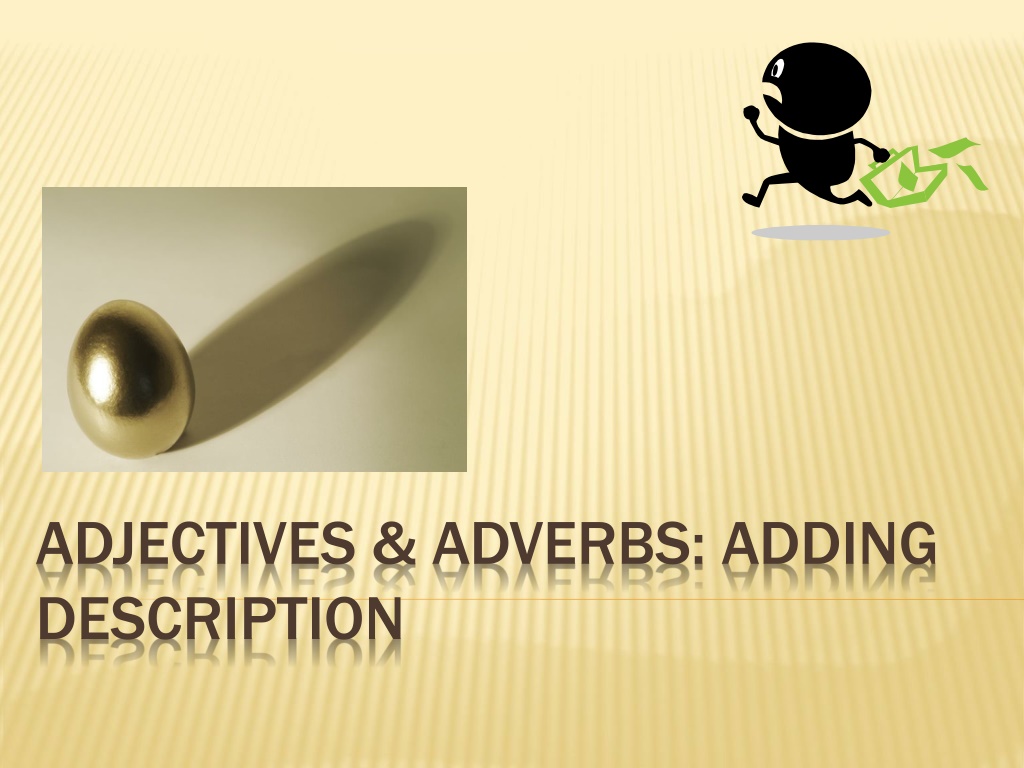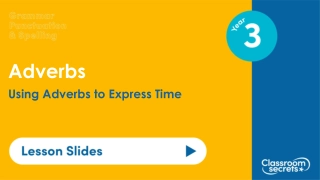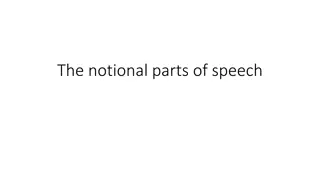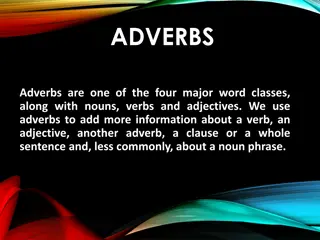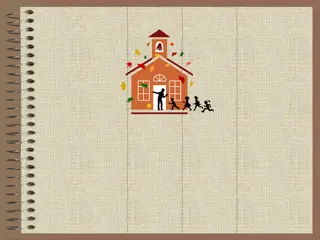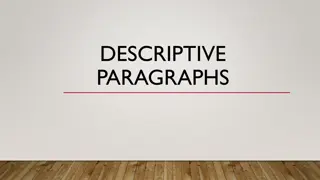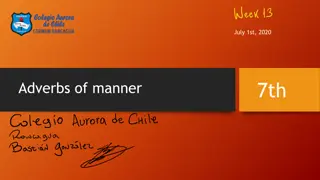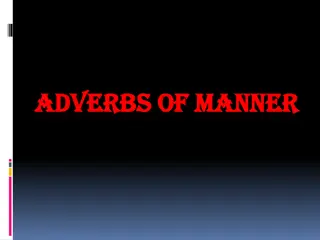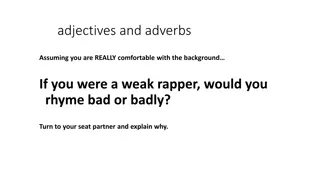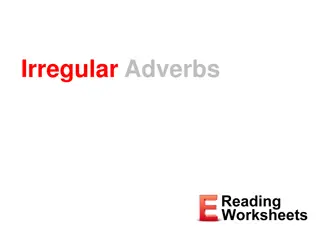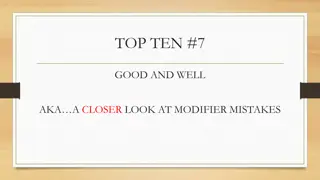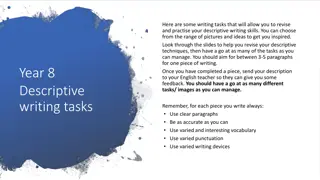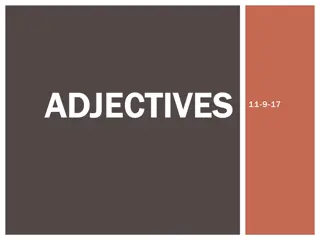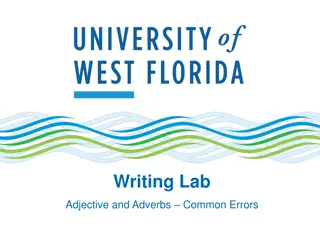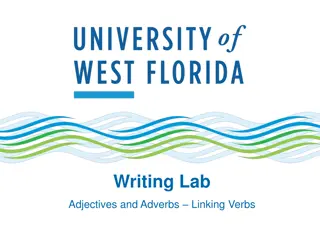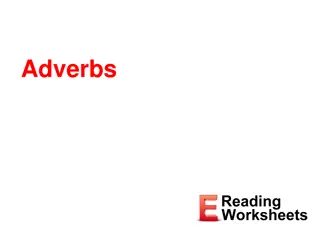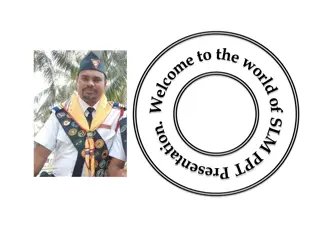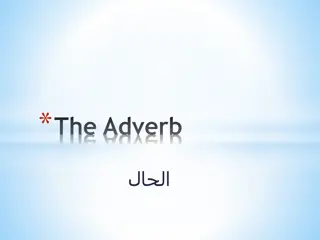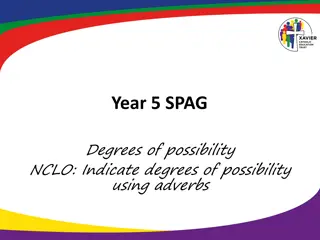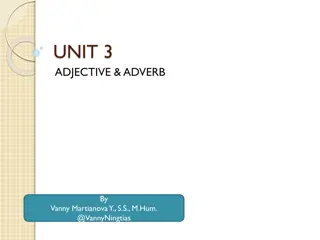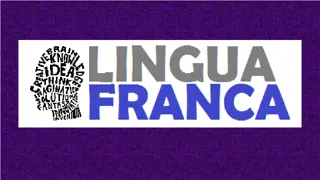Understanding Adjectives and Adverbs for Descriptive Writing
Learn how adjectives and adverbs enhance writing by adding specific details about people, objects, and actions. Adjectives modify nouns to make sentences more descriptive, while adverbs provide additional information about verbs or adjectives. Discover the importance of using these descriptive words to create vivid and engaging content.
Download Presentation

Please find below an Image/Link to download the presentation.
The content on the website is provided AS IS for your information and personal use only. It may not be sold, licensed, or shared on other websites without obtaining consent from the author. Download presentation by click this link. If you encounter any issues during the download, it is possible that the publisher has removed the file from their server.
E N D
Presentation Transcript
ADJECTIVES & ADVERBS: ADDING DESCRIPTION
WHY? We use adjectives and adverbs to add specific details about people, objects, and actions. Without such words, our language and writing would be increasingly straightforward and bland.
ADJECTIVES Notice how adjectives make the second sentence in this pair more descriptive. Coyotes startled the campers. Coyotes startled the campers. Noisy coyotes startled the coyotes startled the sleepy Noisy sleepy campers. campers.
WHAT IS AN ADJECTIVE? An adjective adjective is a word that modifies, or describes, a noun or pronoun. A heavy heavy rainstorm soaked the campsite. Adjectives help you see, feel, taste, hear, and Adjectives help you see, feel, taste, hear, and smell all the experiences you read about. smell all the experiences you read about.
WHAT QUESTIONS? Adjectives answer the questions what kind, which one, how many, and how much. What What kind? kind? Green Green backpack sturdy sturdy tent spicy spicy stew Which ones or ones? How many or how much? last last hamburger third third hike every every lantern two two flashlights many many insects little little moonlight
ADD SOME ADJECTIVES TO ENHANCE THIS SENTENCE. The truck drove down the road. The truck drove down the road. The The graying, rusty graying, rusty truck drove down the truck drove down the red, dirt road. road. red, dirt
ARTICLES The most commonly used adjectives are the articles a a, an an, and the the. A and an are used with singular nouns. Use a a before a word beginning with a consonant sound. Use an sound. an before a vowel It was an an unusual night unusual night so we brought a a lamp lamp.
THE ARTICLE THE The The is an article that points to a particular person, place, thing, or idea. You can use the with singular or plural nouns. the The The hiker cameras cameras. hiker tripped on the the trail trail and dropped the the
THE DIFFERENCE BETWEEN A AND THE Notice how the sentence changes depending on the article you use. Bring me the Bring me a a water bottle from the refrigerator. the water bottle from the refrigerator.
PREDICATE ADJECTIVES A predicate adjective predicate adjective is an adjective that follows a linking verb and describes the verb s subject. A volcanic eruption is violent subject violent. adjective linking verb It is explosive.
PREDICATE ADJECTIVES Pred. adjs. Can follow other linking verbs. Forms of taste, smell, feel, look, become, and seem are often used as linking verbs. The lava looks thick Lava becomes hard thick. hard when it cools.
ADVERBS What is an adverb? An An adverb adverb is a word that modifies a verb, an is a word that modifies a verb, an adjective, or another adverb. adjective, or another adverb. Explorers Explorers eagerly eagerly chase chase adventure. adventure. Some explorers visit Some explorers visit amazingly amazingly beautiful beautiful places. places. Others Others quite bravely quite bravely explore explore the unknown the unknown space. space.
WHAT QUESTIONS? Adverbs answer the questions how where where, or to what extent to what extent. how, when when, Adverbs Adverbs How? How? Suddenly, carefully, sadly Suddenly, carefully, sadly When? When? Now, later, soon Now, later, soon Where? Where? There, up, There, up, ahead ahead To what extent? To what extent? Completely, totally, fully Completely, totally, fully
POSITIONS IN THE SENTENCE Adverbs can appear in different positions in sentences. (after verb) The tourists (after verb) The tourists boarded the bus (before verb) The tourists (before verb) The tourists eagerly bus. bus. (at beginning) (at beginning) Eagerly, Eagerly, the tourists boarded the the tourists boarded the bus. bus. the bus eagerly eagerly boarded the boarded the eagerly. .
(MORE) PREDICATE ADJECTIVES 1. 1. The sun is bright. The sun is bright. 2. 2. The curry tastes spicy. The curry tastes spicy. 3. 3. Last night s homework was impossible. Last night s homework was impossible. 4. 4. James s water bottle was empty. James s water bottle was empty. 5. 5. His parents were proud. His parents were proud.
ADJECTIVE OR ADVERB? Some pairs of adjectives & adverbs are often confused. Good and Well Good and Well Real and Really Real and Really Bad and Badly Bad and Badly
GOOD AND WELL Good Good is always an adjective; it modifies a noun or pronoun. Well Well is usually an adverb, modifying a verb, an adverb, or an adjective. That was a That was a good good documentary about Mt. Everest. documentary about Mt. Everest. The filmmaker presented the information The filmmaker presented the information well well. . After the film, I didn t feel After the film, I didn t feel well well. .
REAL AND REALLY Real is always an adjective. Really is always an adverb; modifying a verb, adverb, or adjective. She prefers She prefers real mountains. mountains. real mountains to paintings of mountains to paintings of The Grand Canyon is The Grand Canyon is really morning. morning. really beautiful in the beautiful in the
BAD AND BADLY Bad Bad is always an adjective. Badly adverb. Badly is always an That wasn t a That wasn t a bad it it badly badly. . bad hike, even though we planned hike, even though we planned I often feel I often feel bad bad about staying indoors so much. about staying indoors so much.
PRACTICE Turn to page 137 in your grammar books. (the little one) Complete numbers 1-10 Then turn to the exercise bank on page 548 and complete 1-10 Then complete 115 & 116 in WB.
MAKING COMPARISONS Adjectives and adverbs can be used to compare people or things people or things. Special forms of these words are used to make comparisons. compare The atmosphere is thinner The water is shallowest shallowest by the shore. thinner in the mountains.
COMPARATIVE FORMS Use the comparative comparative form of an adjective or adverb when you compare a person or thing with one other person or thing. Mt. Rainer is Mt. Rainer is higher Mountain climbing is Mountain climbing is more dangerous skydiving. skydiving. higher than Mt. Hood. than Mt. Hood. more dangerous than than
SUPERLATIVE FORMS Use the superlative superlative form of an adjective or adverb when you compare someone or something with more than one other person or thing. Mt. Everest is the Mt. Everest is the highest I think Mt. Fuji is the I think Mt. Fuji is the most beautiful all. all. highest of the three mountains. of the three mountains. most beautiful mountain of mountain of
CHANGING REGULAR FORMS For most one-syllable modifiers, add er to form the comparative. Add est to form the superlative. One One- -Syllable Syllable Modifiers Modifiers Base Form Comparative Superlative Adjectives Adjectives thin thin brave brave slow slow soon soon thinn thinner er brav braver er slow slower er soon sooner er thinn thinnest brav bravest slow slowest soon soonest est est est est Adverbs Adverbs
CHANGING REGULAR FORMS You can also add er and est to some two- syllable adjectives. With others, and with two- syllable adverbs, use more and most. Two Two- -Syllable Modifiers Syllable Modifiers Base Form Base Form Comparative Comparative Superlative Superlative Adjectives Adjectives shallow shallow awful awful calmly calmly briskly briskly shallow shallower er more more awful more more calmly calmly more more briskly briskly shallow shallowest most most awful most most calmly calmly most most briskly briskly est awful awful Adverbs Adverbs
IRREGULAR FORMS Adjectives: Adjectives: Good, better, best Good, better, best Bad, worse, worst Bad, worse, worst Adverbs: Adverbs: Well, better, best Well, better, best Much, more, most Much, more, most Little, less, least Little, less, least
